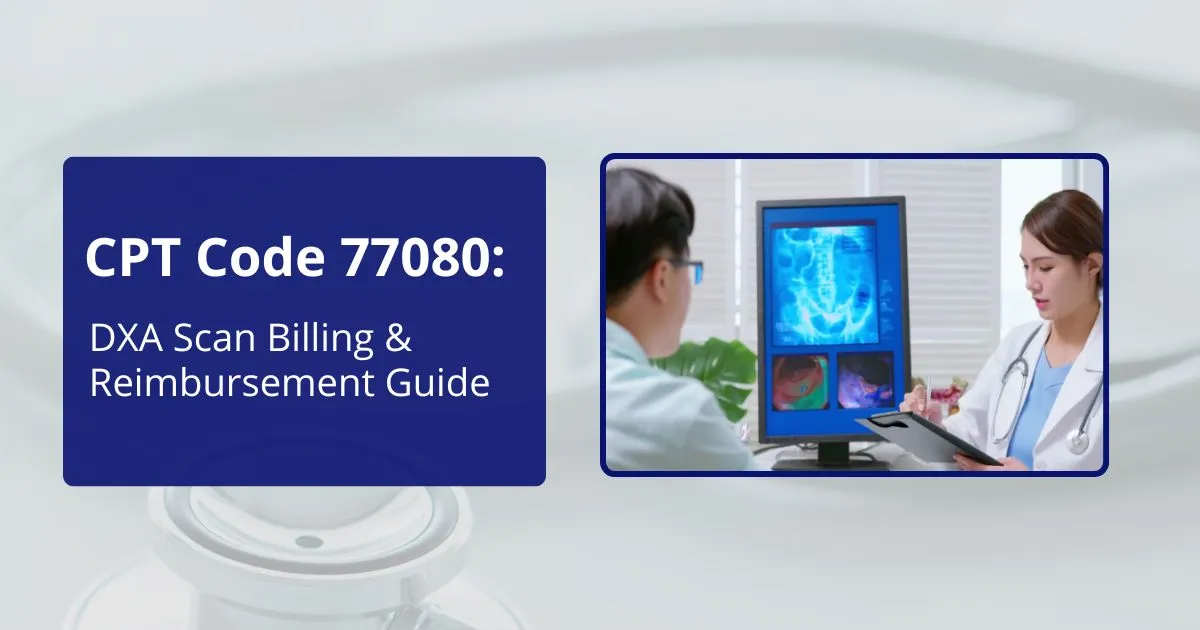Accurate medical coding is integral to ensuring proper reimbursement and compliance with billing regulations. When it comes to DXA scans, a commonly used tool for assessing bone health, the 77080 CPT code is an essential part of the billing process. This guide provides an in-depth understanding of CPT Code 77080, from its definition and medical necessity to billing guidelines and avoiding common errors. If you’re a healthcare provider, radiology professional, or medical biller, read on to master the complexities of 77080 billing.
What is CPT Code 77080?
The 77080 CPT code is specifically used for billing DXA scans of the axial skeleton, which measure bone density in areas like the hips or spine. DXA, or Dual-energy X-ray Absorptiometry, is a vital diagnostic tool for assessing bone health and identifying conditions like osteoporosis.
Accurate use of 77080 CPT ensures proper reimbursement for services rendered, minimizes insurance denials, and reflects the high standards of medical care provided.
For related outpatient clinic visit billing, refer to our Guide to CPT Code G0463: Hospital Outpatient Clinic Visits.
77080 CPT Code Description
The 77080 CPT code is officially described as “Dual-energy X-ray absorptiometry (DXA), bone density study, 1 or more sites; axial skeleton.” This means it applies specifically to the main portions of the skeletal system, such as the hips and spine. Bone density scan CPT code 77080 is used when measuring bone mass in these regions.
Why DXA Scans and CPT Code 77080 Matter
What is a DXA Scan?
A DXA scan, sometimes referred to as a DEXA scan CPT code, is a non-invasive imaging test that uses low-dose X-rays to measure bone density. It is the gold standard for detecting conditions such as osteoporosis, monitoring bone health, and assessing fracture risks in patients.
Applications of a DXA Scan for the Axial Skeleton
When performed on the axial skeleton (hips and spine), CPT Code 77080 provides crucial data for diagnosing bone loss and managing treatment plans over time. It’s particularly valuable for at-risk populations, such as postmenopausal women, elderly patients, or individuals with a family history of osteoporosis.
77080 Medical Necessity
To bill procedure code 77080, documenting medical necessity is critical. Insurers require evidence that the DXA scan is justified based on the patient’s medical needs.
When is CPT Code 77080 Applicable?
Here are some common conditions and scenarios where CPT code for DXA scan is medically necessary:
- Screening for osteoporosis, especially in postmenopausal women or men over 70.
- Monitoring bone loss in patients with chronic conditions, such as rheumatoid arthritis or kidney disease.
- Managing patients undergoing treatments known to weaken bones, such as long-term steroid use.
- Diagnosing unexplained fractures, especially low-trauma/fragility fractures.
Clear documentation, including case history and related data, ensures coding aligns with payer requirements.
Role of Tightly Linked Diagnosis Codes
Using correct dexa diagnosis codes is essential when demonstrating necessity. Common ICD-10 codes for DXA scan such as M81.0 (osteoporosis without current pathological fracture) or Z13.820 (screening for osteoporosis) can support CPT code 77080 billing.
Billing and Reimbursement Guidelines for 77080
Dealing with the specifics of 77080 CPT code reimbursement Medicare can be challenging. Here’s what healthcare providers need to know.
Key Billing Guidelines
- Use 77080 for Axial Skeleton
Ensure that 77080 is used only for DXA scans targeting the axial skeleton (hips and spine). Use alternate codes for different skeletal regions (discussed below).
- Attach Supporting Documentation
Always include documentation supporting medical necessity, including patient history, current symptoms, and relevant ICD-10 codes.
- Check Payer Requirements
Insurers may have specific policies regarding frequency limitations. For example, Medicare typically covers DXA scans every two years unless additional risk factors warrant more frequent testing.
Avoiding Denials
Common denial reasons for 77080 include:
- Failure to demonstrate medical necessity.
- Incorrect or missing ICD-10 DXA screening.
- Submitting claims with outdated or inaccurate documentation.
To avoid these issues, maintain thorough records and stay updated on payer guidelines.
DEXA Scan CPT Code and Related Procedures
While 77080 applies to the axial skeleton, other bone density scan CPT codes are used for different areas of the skeleton or specific scenarios.
- 77081 – For DXA scans of peripheral parts of the skeleton, such as the forearm or heel.
- G0130 – For non-DXA-based bone mineral density studies covered by Medicare.
Properly distinguishing these DXA scan CPT codes ensures accurate billing and compliance with insurance policies.
Proper Use of DEXA Diagnosis Codes
Correctly pairing dexa diagnosis codes with the 77080 CPT code is key to reimbursement success.
Common ICD-10 Diagnosis Codes for DXA Scans
Here are some examples of codes frequently used to support medical necessity for 77080:
- M80.0 – Osteoporosis with pathological fracture.
- M81.0 – Osteoporosis without current fracture.
- Z79.52 – Long-term use of systemic steroids.
- Z13.820 – Routine bone density screening.
Ensure diagnosis codes are accurately assigned based on the patient’s condition and reason for the scan.
Common Errors and Preventing Mistakes
Errors in coding and billing for CPT code 77080 can lead to costly denials. Here are some common mistakes and how to avoid them:
- Using Incorrect CPT Codes
Ensure you’re using 77080 only for dexa scan axial skeleton procedures. Misattributing this code for peripheral scans (which require 77081) is a common error.
- Lack of Supporting Documentation
Payers require a detailed explanation of 77080 medical necessity. Missing or incomplete records often lead to claim rejections.
- Mismatched Diagnosis Codes
Linking inappropriate ICD-10 codes for DXA scan to CPT 77080 can result in payment denial. Review diagnosis codes for compatibility with the CPT code.
Pro Tips for Avoiding Errors
- Invest in regular training for staff on coding updates.
- Use specialized medical billing software to flag potential inaccuracies before claims submission.
- Stay updated on Medicare coverage for DXA scan policies and reimbursement changes.
Partner with Experts to Simplify Billing
Billing for 77080 doesn’t have to be overwhelming. By understanding its guidelines and best practices, you can streamline the reimbursement process and reduce errors.
Providers Care Billing LLC, based in Illinois, USA, specializes in medical billing and coding services. From ensuring accurate documentation to managing claims submissions, our team helps healthcare providers focus on patient care while we handle the complexities of billing.
Contact us today to learn how we can help optimize your medical billing process.




